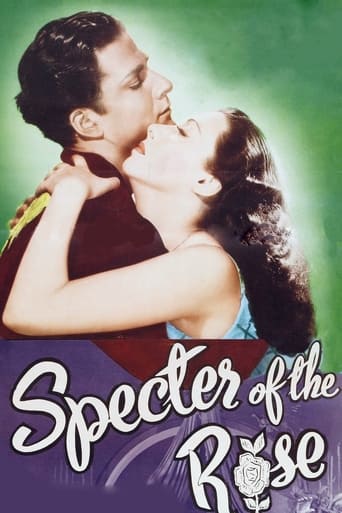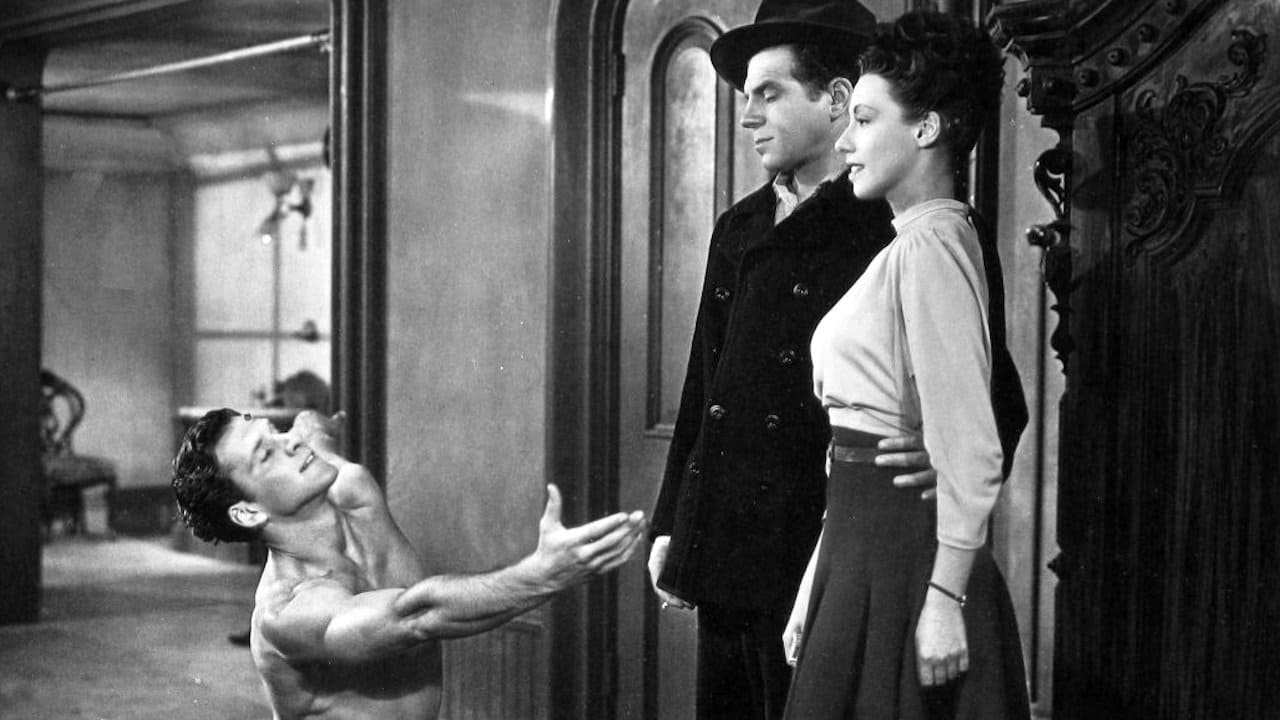MartinHafer
"Andre is not a man...he is a shadow that flickers on the wall..."Andre Sanine: Hug me with your eyes. Haidi: I am. Andre Sanine: Harder. Such is much of the dialog in this film. To be blunt, it's among the worst written dialog I've ever heard and it's often unintentionally funny. Because it is so incredibly bad, it makes it hard to believe that the dialog was written by the incredibly respected guy who wrote such classics as "The Front Page", "Kiss of Death" and many other good films. Perhaps the director should have stepped in and objected, but in this case Hecht was also the director! The bottom line is that the only reasons to watch the film are to laugh at the tripe they consider dialog or if you hated Hecht and wanted to see his worst. As for the story...who cares.
dbborroughs
Ben Hecht's major off the rails story about the possible murder of a ballet's star's first wife.It's a very deliberate film full of beyond purple prose and performances that are way to over the top to be anything but deadly serious. Laughably bad, I sat staring at the screen for fifteen minutes wondering what the heck I was watching, unsure if I should be laughing or not- finally I just started to laugh and went with it...I had no clue why anyone would chose to do this deliberately- especially when its some one who should know better. It was painfully awful in a way that only films that are supposed to be works of art can be. It's a film to make you go- you have got to be f-ing kidding me over and over again
Terrell-4
This movie, as self-conscious as it is in telling a tale of art and madness, is no work by Hollywood hacks. Unfortunately, it's even worse; it's the work of probably Hollywood's greatest screenwriter, Ben Hecht. He was at the height of his fame and clout, so he received the go-head to write, direct and produce what must have been a project close to his heart. It goes to show, once again, that even the greatest creative types need an editor, or at least a friend they respect who'll tell them when something isn't working. The Specter of the Rose tells the story of Andre Sanine (Ivan Kirov), a great ballet dancer who is suspected of killing his wife in a period of madness, while they were dancing Le Spectre de la Rose. For weeks afterwards he simply lay in bed, unable to dance, unresponsive to all those in the world of ballet who see him as a genius. They include Madame la Sylph (Judith Anderson), once a great ballet artist herself who now runs an impoverished ballet school but who maintains the highest standards, and Max Polikoff (Michael Chekhov), an eternally optimistic and unreliable impresario, and as hard up for funds as is Madame la Sylph. Lurking about is a critic, poet and writer, Lionel Gans (Lionel Stander), who cynically comments on what he sees, usually in epigrams. When Sanine meets a young ballerina, Haidi (Viola Essen), he recovers. He has a renewed passion for dancing. He and Haidi fall in love and marry. Polikoff cobbles together enough funds to mount a production of Le Spectre. Madame la Sylph supervises the production, but with misgivings. And Sanine and Haidi will dance together...the story of a young woman who returns from her first ball joyous and clutching a red rose. She falls asleep and the rose comes to life as a lover. They dance, and as he fades away, she dies with a smile of love and longing on her lips. Will history repeat itself with Sanine and his new wife? Somewhere between the opening message, "Here's to the seven arts, that dance and sing, And keep our hearts, green with spring," and the last message spoken by Gans, "Out of our endless tears, we make our own little songs and dances," one assumes is the place Hecht wanted for this movie. That he fails, in my opinion, doesn't make the film so much a failure as a gallant but misguided attempt. It seems to me that Hecht had the bones of an engrossing story, but he was felled by the excesses of his own script and by the problem he created for himself of having to find two dancers who could dance their roles credibly while being good enough actors not to compromise the story. He only managed to find two dancers. The acting by Kirov and Essen, combined with the self-consciousness of the script, is frustrating. Lionel Gans, with his epigrams and over-written posturing, is used by Hecht as a kind of on-screen commentator. He is just irritating. For instance, early in the movie Gans comes to Madame la Sylph's ballet studio with a police detective investigating the death of Sanine's first wife. Polikoff introduces himself to the detective. Gans speaks up with world weary cynicism, "A wilted carnation," he describes Polikoff, "in the Broadway buttonhole. This is Madame la Sylph, the remains of a pirouette. And this is the sad little factory where dancing toys are made." Yet it seems Gans has been carrying a torch for Haidi. When he criticizes Sanine she turns on him. "Oh, you're a monster! I loath you! I just loath you!" she says and begins to cry. Gans looks at her for a moment and says quietly, "I didn't think you could cry. I often cry, at night. Then I think of you and I become full of young words all dancing for you, and then I pretend I'm not a monster. And on this delusion I live until morning." Ben Hecht or not, this sort of writing is awful. Or this exchange between Sanine and Haidi. They are sitting together at a small table. "Hug me with your eyes," he asks her. "I am," she says. "Harder," he replies. What happened to the skillful Ben Hecht of His Girl Friday, Notorious, Nothing Sacred and Wuthering Heights? With the exception of Judith Anderson, who turns in a highly professional job, the other actors are either exaggerations or dull. Michael Chekhov, with a hairdo that looks like it was created for one of the Munchkins, plays an aging, effeminate, eye-rolling, overly-dramatic character who outclasses even Clifton Webb. Lionel Stander, with that tough looking mug and rough voice, seems almost willfully miscast. He's interesting at first, but then the character, a one-note portrayal, becomes tiresome. The two leads both seem to be professional and competent dancers. Kirov, especially, is called upon to do impressive leaps. Neither can act well. Kirov, for modern audiences, looks uncomfortably like a young Leslie Nielson. Hecht, for all this, makes the movie an amusing look at all it takes to make something creative happen, from musicians' unions, agents, society backers and billing lines. The movie also has a fine musical score by George Antheil. Although he paid the bills by writing for movies, Antheil was a widely respected composer of symphonies, chamber works, sonatas and ballets. The music he wrote for the Specter of the Rose ballet in the film features an intriguing and angular waltz that most decidedly doesn't make you think of turn-of-the- century Vienna. As the creation of a hugely gifted writer and outstanding screen-writing craftsman (just check all the movies Hecht was called on to fix without taking credit), The Specter of the Rose is worth watching and even buying. But it is a curiosity piece, an intriguing failure.
Jay Harris
This is the 6th viewing of Spectre of The Rose ( I see this every 10 years or so. Aside from some Ballet scenes, this is primarily a love story centered around a male Dancer & the death of his first wife. Ivan Dixon plays the Dance with grace (he cant act) Viola Essen is the ballerina he falls in love with, ( she also dances gracefully) but cant act. The main reason to see this film is for LIONEL STANDER as a sardonic writer.(he could play this type role in his sleep),He should have been nominated for best supporting actor. Mikail Chekov plays an effeminate producer quite well. The magnificent Judith Anderson is the bitter dance teacher. & of course she is superb,Reccomended for ballet loves & fans of Lionel Stander.rating only **1/2 78 points 6 on IMDb


 AD
AD
